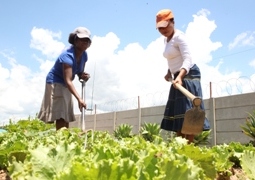
The Minister of Agriculture, Land Reform and Rural Development, Ms Thoko Didiza, briefed the National Council of Provinces (NCOP) on progress made by her department on interventions to mitigate the impact of Covid-19 on the agricultural sector.
Addressing the NCOP on a virtual platform, the Minister said while the interventions were aimed at protecting human health and lives, the “impact is also profound on the social and economic system”. This pandemic has also impacted on household, national and global food security.
She said the pandemic has also shown the stark reality and fault lines in national and global security supply chains, and reminded society of the intricate interwoven and interlinked nature of agriculture and the food sector with other sectors of the economy.
“It exposed inefficiencies in the pricing and distribution of food in the local market, where access and affordability of food was a challenge during the lockdown period. The pandemic also made visible the previously under-recognised role of the informal food sector as a vibrant market and also the informal sector players as a key distributing network for food to our communities,” the Minister said.
Ms Didiza said in an attempt to address the possible negative impact of Covid-19 on small-scale and subsistence farmers, the department availed an amount of R1.2 billion to assist this category of farmers to increase production, and a further R100 million was set aside for the utilisation by commercial farmers through the Land Bank.
Of the R1.2 billion, she explained, a sum of R400 million funding was set aside for the farmers participating in the Pro-Active Land Acquisition Programme and a sum of R20 million was set aside for hygiene products to assist farm workers.
The Minister told the NCOP delegates that the prospects of the agricultural sector were very promising, even under the Covid-19 period. She said the country experienced a bumper grain crop of 15.5 million tons. During the GDP 2020 first quarter report, agriculture grew by 27.8% as compared to the last quarter of 2019. Furthermore, projections from a number of economists predict positive growth for the sector for the 2020 production year.
“While these prospects remain true, it is important to ensure that we continue to support the sector to grow, especially the smallholders and subsistence farmers. While Covid-19 is a disruptive force, we also need to build resilience to economic shocks, climate change, land degradation, biodiversity loss, water scarcity, and pests and diseases. It is time to turn this crisis into an opportunity to move us towards a better “new normal”, that is to transform current cropping systems to more sustainable and resilient ones that have the ability to reduce risks and vulnerabilities to multiple threats, and to absorb, adapt and recover in a timely manner,” said Minister Didiza.
The virtual session was also attended by MECs for Agriculture and Land Reform, who also gave an update on provincial intervention plans.
During question time on the Minister’s statement, permanent and special delegates to the NCOP asked the Minister about her department’s plans to address the attacks on and killing of farmers.
“As government the issue of farm attacks and farm worker abuses is a matter of concern and we are working with the police to ensure the perpetrators of these crimes are brought to book. All of us must be concerned about the safety of farmers and the conditions of farmers and farm workers,” she said.
She also told the NCOP that together with the Department of Police they have launched the Rural Safety Security Sector strategy to deal with safety on farms and in rural communities.
Members also raised concerns about reports of some farmers who were selling the relief vouchers they got from the department, and the Minister promised to follow up on these allegations.
NCOP Chairperson, Mr Amos Masondo, welcomed the slowdown in infections saying it opens “new prospects to restore our livelihoods and rebuild our economy”.
By Sakhile Mokoena
25 August 2020

